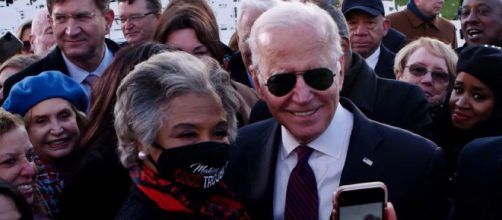U.S. President Joe Biden has brushed aside public opinion polls indicating a sharp decline in support for his administration. When asked about the polls at a January 19 press conference, Biden said simply: "I don’t believe the polls."
He spoke to the press about a number of issues affecting his popularity, such as the coronavirus pandemic, inflation and the U.S. withdrawal from Afghanistan.
About 40% of Americans approved of Biden's performance, according to a Gallup report published on January 18. Biden's approval rating had been 57% at the start of his presidency, Gallup noted.
According to a POLITICO/Morning Consult poll, 31% of Americans would give Biden an "A" or "B" grade for his first term, while 37% would give him an "F." The results of the poll of 2,005 registered were published on January 19.
The Hill identified the following three possible reasons for Biden's low approval ratings:
- The rising levels of COVID-19 cases;
- Inflation;
- The chaotic aftermath of Biden's decision to pull American forces out of Afghanistan.
These factors were addressed by Biden at the press conference. He said the Omicron variant of COVID-19 had caused "frustration and fatigue" among the public. But progress was being made, he added. "We’ve gone from 90 million adults with no shots in arms last summer down to 35 million with no shots as of today," he said.
The President pointed out that Americans could now order free at-home COVID tests. There were also 20,000 sites offering free in-person COVID tests, he said. "We’re not going back to lockdowns. We’re not going back to closing schools," Biden said.
Building up the economy
The COVID-19 pandemic had caused "a lot of economic complications, including rapid price increases across the world economy," he said. The President said he had been pursuing a plan to create "a more productive economy with greater capacity to deliver goods and services." He explained that the plan consisted of three parts:
- Restoring the supply chain. The President said that, by working with businesses and organized labor, his administration had succeeded in avoiding "a real crisis around the holidays." He complained that news reports of shortages had been exaggerated. "I often see empty shelves being shown on television. Eighty-nine percent are full, which is only a few points below what it was before the pandemic," Biden said.
- Lowering expenses for families with Build Back Better. The President said his Build Back Better plan, if approved by Congress, would ease the strain on family budgets by lowering the cost of childcare, eldercare and prescription drugs. Affordable childcare would enable many women to re-enter the workforce, he said, thus boosting the economy.
- Promoting competition. Biden said that "in too many industries, a handful of giant companies dominate the market." This, he said, "has reduced competition; squeezed out small businesses and farmers, ranchers; and increased the price for consumers." The President said he had already issued an executive order "to tackle unfair competition in our economy."
'No apologies' for leaving Afghanistan
Biden said he did not regret withdrawing American military forces from Afghanistan.
"There was no way to get out of Afghanistan, after 20 years, easily.... And I make no apologies for what I did." If Americans had stayed there longer, they would have only succeeded in "sending more body bags back home," he said.
'I didn’t overpromise'
Biden was asked if he had promised to do too much during his first year in the White House. "Look, I didn’t overpromise, but I have probably outperformed what anybody thought would happen," he said. Biden acknowledged that the number of deaths from COVID-19 was high, but he said that it had been coming down. The President noted that he had been unable to persuade Republicans to abandon obstructionism. "I did not anticipate that there’d be such a stalwart effort to make sure that the most important thing was that President Biden didn’t get anything done," he said.
I'm not Bernie Sanders
Peter Doocy, of Fox News, asked Biden to explain why his administration was striving "to pull the country so far to the left." Biden replied that he was a "mainstream" member of the Democratic Party. He said he had not proposed expensive programs until after finding ways to fund them.
Biden said Doocy and his colleagues "have been trying to convince me that I am Bernie Sanders. I’m not. I like him, but I’m not Bernie Sanders. I’m not a socialist." He noted that his policies had been consistently supported by all but two of the 50 Democrats in the U.S. Senate.


